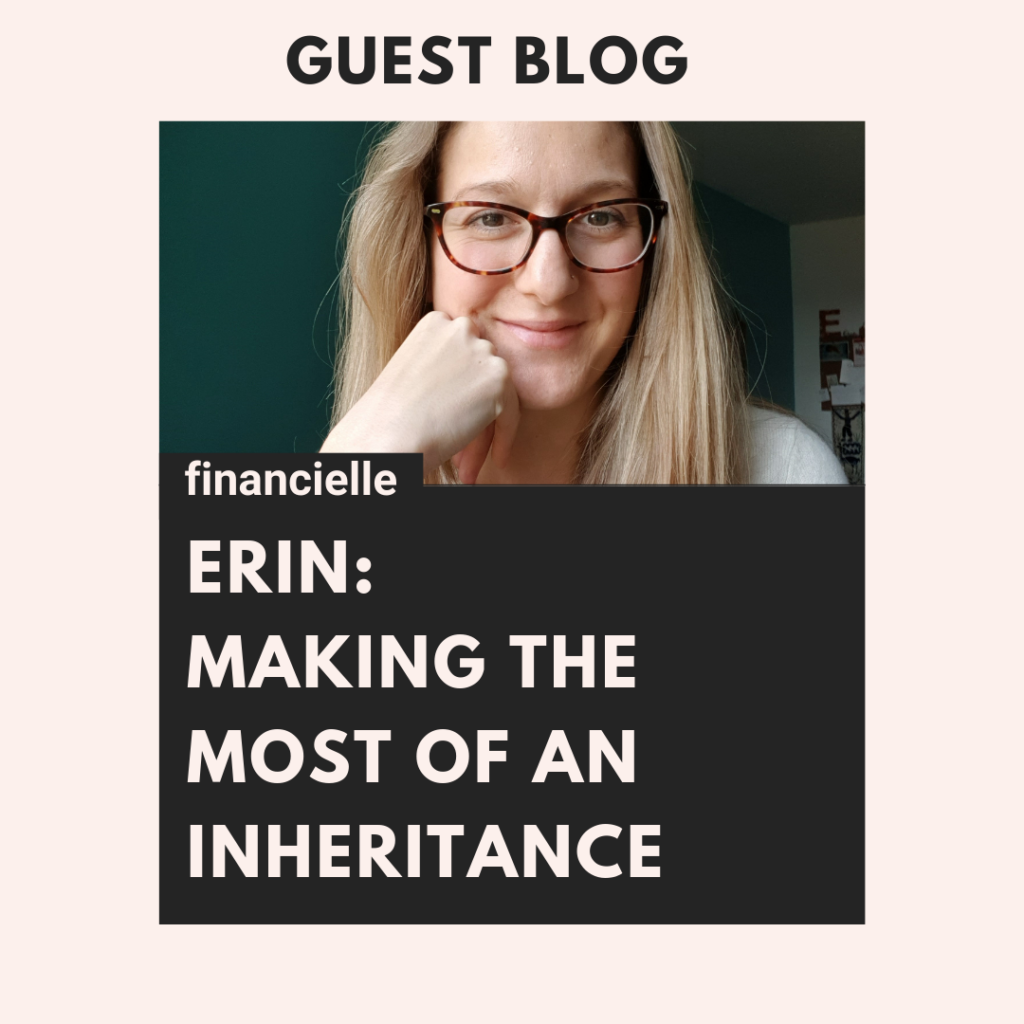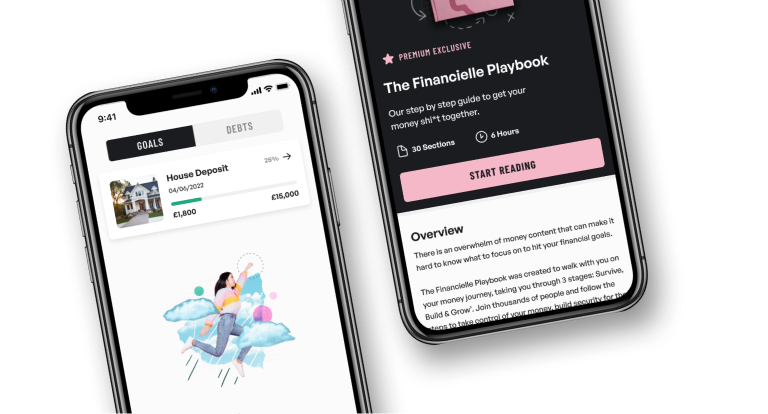Guest Post by Erin: Making the most of an inheritance

We are so very grateful to have Financielle community member Erin, blogger at Erin Isabel, share her emotional experience of receiving an inheritance and trying to make the most of such a gift.
Making the most of an inheritance
This is a tricky subject, I know. Inheriting anything comes with a whole mixed bag of feelings, but somehow when it is money, the emotional baggage is bigger and more complicated. There is grief, of course, but also perhaps excitement – which feels wrong given someone, who was likely quite close to you, has died.
If you’re anything like me, you may have felt it was wrong or disrespectful to even think about the money and what you might do with it, before it was actually in your bank account. You will also be grieving, which is difficult and takes time.
I do also know that this is a subject that may alienate some – my apologies to you.
Yet it is a subject worth thought and consideration for two reasons. The first being it is important to think carefully how such a windfall might be used. The second is that, in my experience, choosing the right person or people to talk to or seek advice about an inheritance can be something of a minefield. So often, those who find themselves in the position of being left money find they don’t want to raise it in conversation for fear of receiving unwanted attention or a negative reaction.
I was 26 when I learned I would be inheriting some money and one of the first people I told was a close friend. Much as I didn’t want to boast, I was giddy with excitement and eager to share the news – it had come as a complete surprise and I wasn’t planning on telling many people. But I assumed my friend would be happy for me and want to celebrate my good fortune.
It didn’t turn out that way unfortunately and her reaction was pretty underwhelming, bordering on resentful.
I was fairly put-out, although perhaps looking back it was unfair of me to expect her to be thrilled for me. After all, at the time she was scrimping and saving for a house deposit and I had suddenly had the same fall straight into my lap.
But her reaction made me think twice about sharing the news with anyone else and as such I had no-one, really, to discuss my options with.
Getting on the property ladder was something I’d been wanting ever since I experienced first-hand how rubbish house-sharing can be and it seemed to me the sensible thing to do with the money. But despite the fact that it was a fairly large sum of money I was single, living in London and working an entry-level job. I was nowhere near in the position of getting a mortgage alone.
So, investing in property straight away was not an option for me.
A friend and I discussed getting a mortgage together and using my inheritance for the deposit. That idea never really got off the ground – and thank goodness because when I left London for a change of career a few months later, the friendship did not survive.
In the end I did several things with the money, some good, some less good. Some examples include:
- When I moved out of London, I took a car on a PCP, paying £250 per month which was way too much for my new salary to cope with, leading me to dip into my inheritance to cover the shortfall;
- I clubbed together with my siblings (who also received some money) to buy our mother a horse; and
- After moving yet again for work and finding the job wasn’t what I was hoping for, I resigned and lived off my inheritance for several months.
None of these things are terrible decisions to make, but the point I want to explore is that, because I did not have a solid long-term plan or existing budgeting habit in place, I was making decisions about this money with only part of the information I needed. I didn’t have a clear picture of my outgoings nor a plan for building savings long-term; I was only thinking about the immediate-term. I look back now and want to shake myself!
But, as lots of clever people say, those decisions brought me to where I am today and I can honestly say I wouldn’t change my life as it is now. What is absolutely clear from the list above is that I was acting based on short-term wants, rather than long-term goals.
And there is no denying that, had I made some different choices initially, when it came to buying my first home at the age of 29 I probably would have been able to afford a two-bedroom flat instead of a one-bedroom, perhaps on the ground floor with a garden rather than first floor with a balcony. Oh the benefits of hindsight!
So, if it was 32-year-old me inheriting sixty-odd grand instead of 26-year-old me, what would I do differently? Well, below I have tried to detail the steps I think I would take now, five years and a lot of learning later:
Step One: Think about your goals – does this windfall just bring them closer or does it change them?
This is a great place to start because there will be several months between you learning you will be receiving an inheritance and the money actually reaching you. This is a perfect time to sit down and reconnect with your goals. You will not necessarily know exactly how much you will be inheriting straight away, but you are likely to have an idea. This will hopefully give you enough information to know what the impact on your life goals could be.
This was a stumbling block for me. My goal was a bit vague and nonspecific – to buy a house (size, type and location undefined) once my salary allowed it – who knew when that might be. I hadn’t looked into property prices in my area, or how much more I might need to save to bring my deposit up to a percentage that might be favourable to a lender.
So the key is to be specific with your goals. If you want to buy a house – where, when and what can you afford? If you want to start a business – do you have a business plan? If you want to get married and have a big wedding – where, when and how many guests will you invite?
A good way of defining your goals is to imagine yourself in five or ten years time. What does your life look like? Where are you living? What is your home like? What is your job? How much are you earning? Are you married? Do you have children? If so, how many and how old are they?
Once you have this picture in your mind you can work backwards to where you are today and start thinking about the things you need to change or action now and in the coming years, to make that picture a reality. If you want to be earning £10k more than you do now you need to think about your current career path and employer. Are there plenty of opportunities for progression? Are you actively seeking them? If not, is it time to think about a change of career or employer, or to schedule a meeting with your line manager to discuss your future?
If you hope to be married, are you in a committed relationship? Have you discussed your desire to be married one day, with your partner? Have you been honest and clear about timescales? If you don’t see eye to eye on this, is it time to consider if the relationship is one you want to pursue long-term? The same goes for children – if you want to be the parent of a 3-year-old in 5 years time, have you talked about starting a family with your partner?
If you aren’t yet sure of your goals, then I would absolutely recommend taking financial advice and investing your windfall in a way that aligns with your attitude to risk. If the money is already invested when it reaches you, an advisor can look at the portfolio and offer advice on its performance and whether you could be receiving a better rate of return if it was invested differently.
Step Two: Don’t spend anything for the first 3 months*
*unless you have a lot of debt, in which case skip to step three
The money I inherited came to me as a number of investments. The only thing I did when the investments were first transferred to me, was to have an independent financial advisor take a look at their performance and then talk me through it. They weren’t doing brilliantly in terms of earning a return but they weren’t losing value and the investments were fairly low-risk, which suited me at the time.
Taking a breath once the much-anticipated money is in your possession will also help you avoid impulse-spending that you may later regret. Unless you are planning to…
Step Three: Pay off debt
It may seem counterintuitive to have money come in the door one minute and straight out the next, disappearing into the abyss of credit-card, store-card or loan payments that may have been trickling out of your account on a regular basis for years.
But the thing is, freeing yourself from debt so that you can start putting your money towards your goals, is incredibly empowering. The regular payments going out each month are stealing from your future and if the most your windfall does is get you back to zero – then WOW. That is a huge jump forward on a journey that could, and indeed might already, have taken years.
I’d also like to address the concept of not paying off debt if the money inherited isn’t enough to cover it all. This will mean you don’t have the inheritance but you are still paying debt off monthly – on the face of it, your life hasn’t changed. This can feel anticlimactic and disappointing. There’s no spending high, no new car to drive or house to live in.
In this case what you have to appreciate is the potential for delayed-gratification. Because what this windfall will have done for you is bring your debt-free date closer – possibly by quite a long way.
Finally, there is one other thing I try to do regularly. I remember the relative that left me the money I eventually used for my house deposit and I send a little gratitude out into the universe. I hope that, were he alive today, he would approve of the choices I made with the money he left me.
I am certainly hugely grateful for his gift and hope to grow it to support the life I want to lead, my goals and my family’s wellbeing.
We would like to thank Erin for sharing her experience with our community. You can find more from Erin at www.erinisabel.co.uk.









